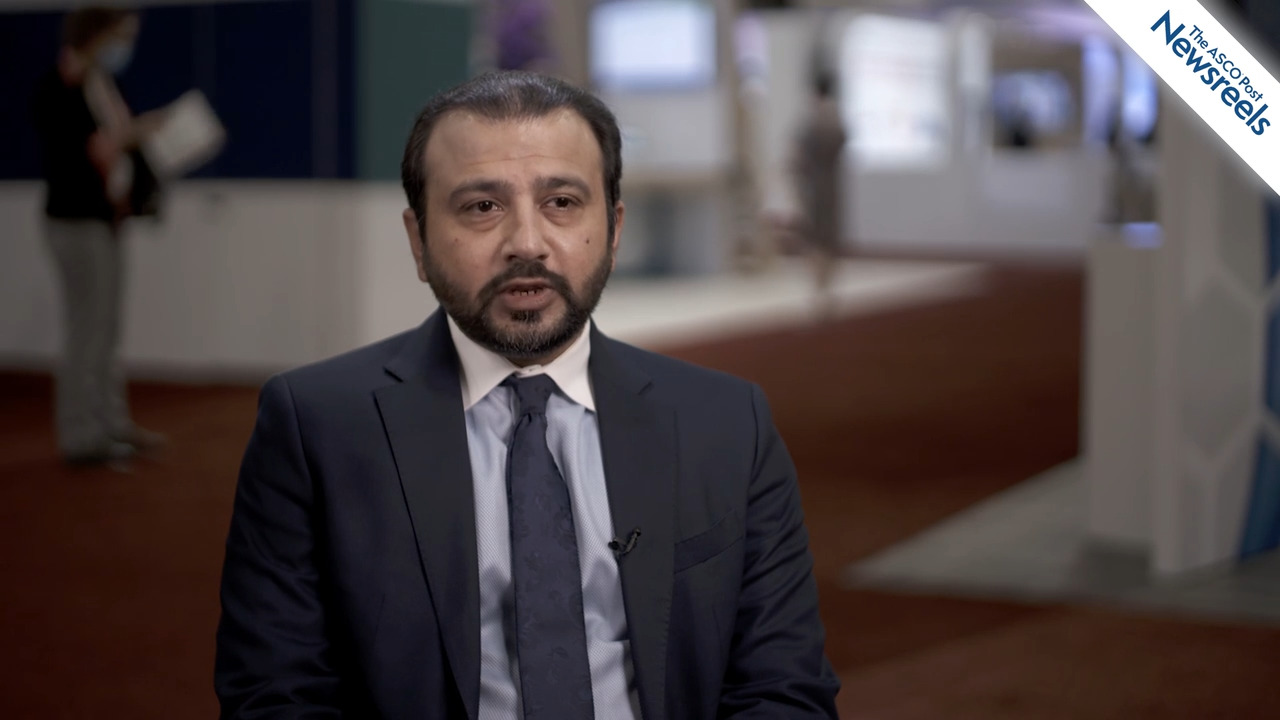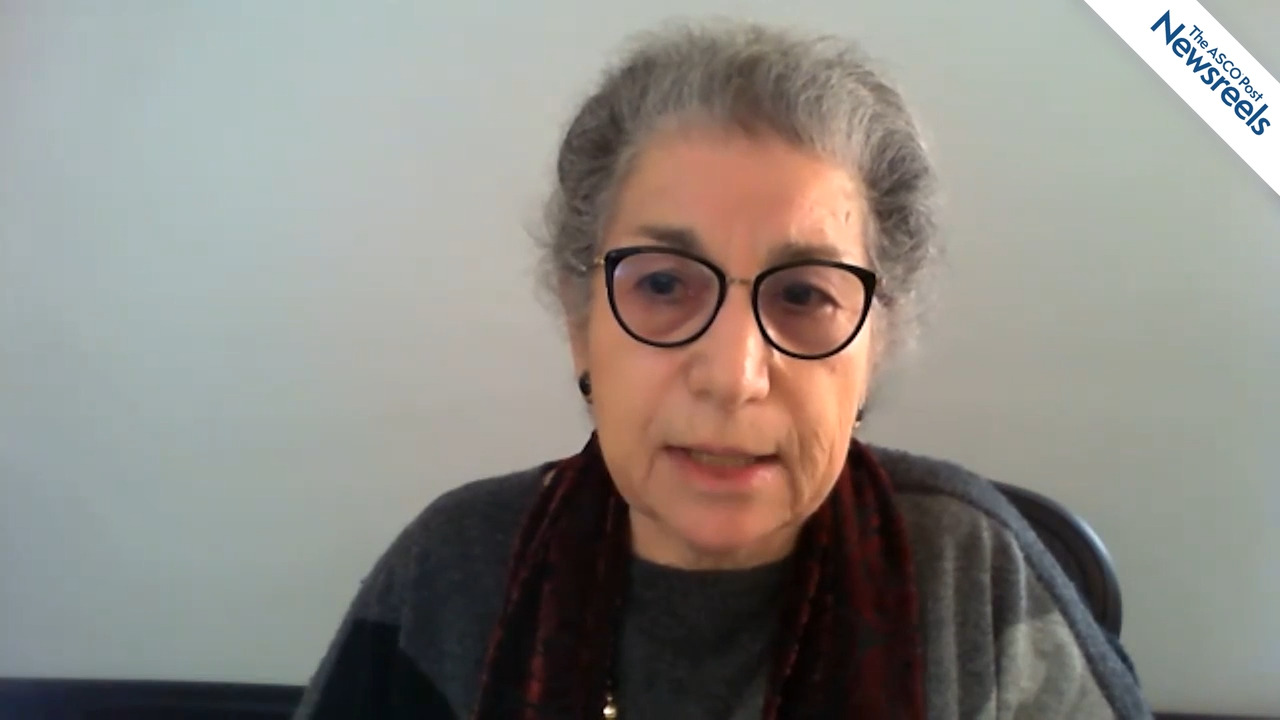Association of HLA-A*03 With Outcomes of Immune Checkpoint Inhibition for Advanced Cancers
In a study reported in The Lancet Oncology, Naranbhai et al found that the presence of HLA-A*03 was associated with poorer outcomes in patients receiving immune checkpoint inhibitors for advanced cancers. As stated by the investigators, “Predictive biomarkers could allow more precise use of immune...
European Genome-Wide Association Study of Genetic Variants in Alcohol-Related Hepatocellular Carcinoma
In a case-control genome-wide association study among persons of European ancestry reported in The Lancet Oncology, Trépo et al identified common genetic variants associated with the risk of alcohol-related hepatocellular carcinoma (HCC). Study Details The study involved a discovery cohort of 2,107 ...
Molecular Analysis Advances Risk Profiling and Assessment of Immunotherapy Response in Smoldering Myeloma
Molecular and genetic research has advanced the categorization of different risk groups in patients with smoldering myeloma. Notable presentations at the 2021 American Society of Hematology (ASH) Annual Meeting & Exposition included reports on biomarkers to predict response to immunotherapy in...
Personalized Therapy vs Physician’s Choice of Treatment for Patients With Residual Triple-Negative Breast Cancer After Neoadjuvant Chemotherapy
In a phase II trial reported in the Journal of Clinical Oncology, Schneider et al found that genomically directed therapy did not improve 2-year disease-free survival vs treatment of physician’s choice in patients with residual triple-negative breast cancer following neoadjuvant chemotherapy. Study ...
Expert Point of View: Myung-Ju Ahn, MD, PhD
Myung-Ju Ahn, MD, PhD, Professor in the Department of Hematology and Oncology at Samsung Medical Center, Sungkyunkwan University School of Medicine, South Korea, said the novel regimen of sintilimab, IBI305, and chemotherapy is a promising approach in EGFR-mutated nonsquamous non–small cell lung...
ORIENT-31: Novel Four-Drug Regimen Evaluated in EGFR-Mutated NSCLC
A four-drug combination of the anti–PD-1 antibody sintilimab, the bevacizumab biosimilar IBI305, plus pemetrexed and cisplatin chemotherapy significantly improved progression-free survival compared with chemotherapy alone in patients with advanced nonsquamous non–small cell lung cancer (NSCLC) with ...
Eunice S. Wang, MD, on FLT3-Mutated AML: Gilteritinib and Azacitidine for Intensive Induction Chemotherapy–Ineligible Patients
Eunice S. Wang, MD, of Roswell Park Comprehensive Cancer Center, discusses phase III results showing that gilteritinib and azacitidine led to significantly higher composite complete response rates in patients with newly diagnosed FLT3-mutant acute myeloid leukemia who are ineligible for intensive induction chemotherapy. Overall survival was similar to that of azacitidine alone (Abstract 700).
Effect of TP53 Alterations on Outcomes of CD19-Targeted CAR T-Cell Therapy for Patients With Large B-Cell Lymphoma
In a single-center retrospective study reported in the Journal of Clinical Oncology, Shouval et al found that the presence of TP53 alterations was associated with poorer outcomes in patients treated with CD19-targeted chimeric antigen receptor (CAR) T-cell therapy (CD19–CAR-T) for relapsed or...
Sotorasib in Previously Treated Patients With KRAS G12C–Mutant Colorectal Cancer
In a prespecified analysis of the phase II CodeBreaK100 trial reported in The Lancet Oncology, Marwan Fakih, MD, and colleagues found that the KRAS G12C protein inhibitor sotorasib showed modest activity in patients with previously treated KRAS G12C–mutant colorectal cancer. Study Details The...
Talha Badar, MD, on TP53-Mutated AML and the Impact of Allogeneic Stem Cell Transplantation on Survival
Talha Badar, MD, of the Mayo Clinic, discusses the near-universal poor outcomes for patients with TP53-mutated acute myeloid leukemia and the findings that show allogeneic stem cell transplantation appears to improve the long-term survival in a subset of these patients. Effective therapies may successfully bridge patients to transplant and prolong survival for those who are transplant-ineligible (Abstract 797).
Ivosidenib/Azacitidine vs Azacitidine Alone in Patients With Newly Diagnosed IDH1-Mutated AML
In the phase III AGILE trial, the combination of ivosidenib and azacitidine was found to be superior in treating newly diagnosed patients with IDH1-mutated acute myeloid leukemia (AML) compared to azacitidine alone in terms of event-free survival, the study’s primary endpoint. The combination also...
Patricia A. Ganz, MD, on Early Breast Cancer, Olaparib, Chemotherapy, and Quality of Life
Patricia A. Ganz, MD, of the University of California, Los Angeles, discusses quality-of-life results from the phase III OlympiA study of adjuvant olaparib after (neo)adjuvant chemotherapy in patients with germline BRCA1/2 mutations and high-risk HER2-negative early breast cancer (Abstract GS4-09).
Patients With Hormone Receptor–Positive Breast Cancer and Emergent ESR1 Mutations May Benefit From Early Switch to Fulvestrant/Palbociclib
Among patients with hormone receptor–positive breast cancer treated with an aromatase inhibitor plus palbociclib, those who displayed a rising ESR1 mutation detected in their blood before disease progression doubled their median progression-free survival following a switch to fulvestrant plus...
Association of TP53 Gain-of-Function and Non–Gain-of-Function Mutations With Outcomes in Left-Sided vs Right-Sided Metastatic Colorectal Cancer
In a study reported in the Journal of Clinical Oncology, Pan et al found that overall survival was poorer among patients with metastatic right-sided vs left-sided colorectal cancer with TP53 mutations, driven by poorer outcomes in those with non–gain-of-function mutations, and that gain-of-function ...
Molecular Tumor Profiling May Improve Treatment Matching for Patients With Metastatic Breast Cancer
The use of multigene sequencing and SNP array as a therapeutic decision tool improved the outcomes of patients with metastatic breast cancer if the patients carried alterations classified in the I/II tiers of the ESMO Scale for Clinical Actionability of Molecular Targets (ESCAT), according to...
Poziotinib in Previously Treated Patients With NSCLC and HER2 Exon 20 Insertion Mutations
In a cohort of the phase II ZENITH20-2 trial reported in the Journal of Clinical Oncology, Le et al found that the tyrosine kinase inhibitor poziotinib produced responses in previously treated patients with non–small cell lung cancer (NSCLC) and HER2 exon 20 insertion mutations. Study Details In...
Association of Donor Clonal Hematopoiesis With Outcomes in Hematopoietic Stem Cell Transplant Recipients
In a study reported in the Journal of Clinical Oncology, Gibson et al identified significant associations of donor clonal hematopoiesis with outcomes in patients undergoing allogeneic hematopoietic stem cell transplantation (HCT). As stated by the investigators, “Clonal hematopoiesis can be...
Dabrafenib Plus Trametinib in BRAF V600E–Mutant High- and Low-Grade Glioma
In an interim analysis of a phase II basket trial (ROAR) reported in The Lancet Oncology, Patrick Y. Wen, MD, and colleagues found that the combination of dabrafenib and trametinib produced responses in adult patients with recurrent or progressive BRAF V600E–mutant high-grade and low-grade glioma. ...
Keith T. Flaherty, MD, on Results From the DREAMseq Trial
Invited discussant of the phase III DREAMseq trial, Keith T. Flaherty, MD, said the findings still leave room for nuanced decision-making.1 Dr. Flaherty is Professor of Medicine at Harvard and Director of the Henri and Belinda Termeer Center for Targeted Therapy at the Massachusetts General...
DREAMseq Trial: In Advanced Melanoma With BRAF Mutations, Start With Immunotherapy
In the treatment of patients with advanced melanoma containing BRAF mutations, initial treatment with an immunotherapy combination achieved superior overall survival compared with targeted therapy in the phase III DREAMseq trial, also known as the ECOG-ACRIN EA6134 trial. The results were reported ...
Cancer Incidence and Patterns in Individuals With Pathogenic/Likely Pathogenic Germline TP53 Variants
In an observational cohort study reported in The Lancet Oncology, de Andrade et al identified cancer incidence and patterns in individuals meeting criteria for Li-Fraumeni syndrome on the basis of presence of pathogenic or likely pathogenic germline TP53 variants. As stated by the investigators,...
ALK Inhibition for Pediatric Patients With Advanced ALK-Positive Malignancies
In a phase I dose-escalation and dose-expansion study reported in The Lancet Oncology, Fischer et al found that the ALK inhibitor ceritinib produced durable responses in pediatric patients with relapsed or refractory, locally advanced or metastatic ALK-positive malignancies. Study Details In the...
Development of Phenotypic Spectrum Categorization for Li-Fraumeni Syndrome
In a study reported in JAMA Oncology, Kratz et al analyzed data from the International Agency for Research on Cancer (IARC) TP53 Database to define a phenotypic spectrum categorization for Li-Fraumeni syndrome. As stated by the investigators, “Li-Fraumeni syndrome is a cancer predisposition...
Association of KRAS Variants With Outcomes After Curative Resection of Intrahepatic Cholangiocarcinoma
In a Chinese single-institution cohort study reported in JAMA Surgery, Zhou et al found that the presence of somatic G12 KRAS variants was associated with poorer overall and disease-free survival in patients who had undergone curative resection of intrahepatic cholangiocarcinoma. Study Details The ...
Study Reveals Genomic Differences Between 14 Tumor Types in Younger vs Older Adults
The results of a study published by Lee et al in Cell Reports suggest that several genetic hallmarks may play key roles in identifying precise treatment options for young adult patients with cancer. The investigators, who systematically compared the genomes of 14 different types of cancers that...
Adjuvant Gefitinib vs Cisplatin/Vinorelbine for Completely Resected EGFR-Mutant Stage II to IIIA NSCLC
In the Japanese phase III IMPACT trial reported in the Journal of Clinical Oncology, Tada et al found that adjuvant gefitinib did not improve disease-free survival vs cisplatin/vinorelbine in patients with completely resected stage II to IIIA EGFR-mutant non–small cell lung cancer (NSCLC). In the...
Germline Pathogenic Variants in Cancer Predisposition Genes and Risk for Invasive Lobular Carcinoma of the Breast
In a study reported in the Journal of Clinical Oncology, Yadav et al found that germline pathogenic variants in the cancer predisposition genes ATM, BRCA2, CDH1, CHEK2, and PALB2 were associated with an increased risk of invasive lobular carcinoma of the breast, with no association with BRCA1...
FDA Pipeline: Novel Treatments in Lymphoma, Nasopharyngeal Cancer, Solid Tumors, and More
Recently, the U.S. Food and Drug Administration (FDA) granted Priority Review to agents for several kinds of lymphoma, as well as nasopharyngeal cancer; a Breakthrough Therapy designation for a treatment for patients with NTRK-positive advanced solid tumors; and Fast Track designation for...
Five-Year Follow-up of Olaparib Maintenance for Newly Diagnosed Patients With Advanced BRCA-Mutant Ovarian Cancer
As reported in The Lancet Oncology by Susana Banerjee, MBBS, PhD, and colleagues, 5-year follow-up of the pivotal phase III SOLO-1/GOG 3004 trial has shown a median progression-free survival of 56 months with maintenance olaparib following response to platinum-based chemotherapy in newly diagnosed...
FDA Approves Asciminib for Philadelphia Chromosome–Positive CML
On October 29, the U.S. Food and Drug Administration (FDA) granted accelerated approval to the kinase inhibitor asciminib (Scemblix) for patients with Philadelphia chromosome–positive chronic myeloid leukemia (Ph+ CML) in chronic phase who have been previously treated with two or more tyrosine...
Rates of Occult Gastric Carcinoma in Patients With Hereditary Lobular Breast Cancer Due to CDH1 Genetic Variants
In a single-institution prospective cohort study reported in JAMA Surgery, Gamble et al found that patients with hereditary lobular breast cancer due to CDH1 variants also had a high prevalence of occult signet ring cell gastric carcinoma. Study Details The study involved 283 patients from 151...
First-Round Results of Prostate Cancer Screening for Men With Pathogenic Variants in Mismatch Repair Genes
As reported in The Lancet Oncology by Bancroft et al, the first round of prostate cancer screening in the IMPACT study of men with pathogenic variants in mismatch repair genes showed an increased risk of prostate cancer in carriers of MSH2 and MSH6 variants compared with noncarrier controls. As...
Survey of U.S. Oncologists on Genetic Counseling and Testing for Black Women With Breast Cancer
As reported in the Journal of Clinical Oncology by Ademuyiwa et al, a survey of U.S. breast oncologists showed that physicians believe that Black women with breast cancer face more barriers to genetic counseling and testing compared to White women with breast cancer. Study Details The study...
Addition of Enasidenib to Azacitidine in Newly Diagnosed IDH2-Mutant Acute Myeloid Leukemia
As reported in The Lancet Oncology by Courtney D. DiNardo, MD, and colleagues, an interim analysis of the phase II portion of a phase Ib/II trial (AG221-AML-005) showed that the addition of the oral mutant IDH2 protein inhibitor enasidenib to azacitidine significantly improved overall response rate ...
Diana D. Shi, MD, on IDH-Mutant Gliomas: De Novo Pyrmidine Synthesis Inhibitor Under Study
Diana D. Shi, MD, of Dana-Farber Cancer Institute and Brigham and Women’s Cancer Center, discusses studies being planned and already underway to test BAY 2402234, a de novo pyrimidine synthesis inhibitor that possibly could be used clinically to target IDH-mutant gliomas and may act as a tumor-selective radiosensitizer (Abstract 167).
Mobocertinib for Previously Treated Advanced NSCLC With EGFR Exon 20 Insertion Mutations
On September 15, 2021, the kinase inhibitor mobocertinib was granted accelerated approval by the U.S. Food and Drug Administration (FDA) for adults with locally advanced or metastatic non–small cell lung cancer (NSCLC) with EGFR exon 20 insertion mutations, as detected by an FDA-approved test,...
Expert Point of View: Omid Hamid, MD
Commenting on the SECOMBIT trial was Omid Hamid, MD, Chief of Translational Research and Immunotherapy at The Angeles Clinic & Research Institute, a Cedars-Sinai Affiliate, and Co-Director, Cutaneous Malignancy Program, Cedars-Sinai Cancer. Dr. Hamid said SECOMBIT addresses an important...
SECOMBIT Trial Evaluates Optimal Treatment Sequencing in BRAF-Mutated Melanoma
Patients with untreated, metastatic BRAF-mutated melanoma may benefit from receiving immunotherapy first, moving to targeted therapy in the second line, data from the updated overall survival analysis of the randomized, phase II SECOMBIT trial suggest.1 The study aimed to define the optimal...
Relationship Between Preexisting TP53 CHIP Variants and Risk of Secondary Myeloid Neoplasms in High-Grade Ovarian Cancer
In a study reported in JAMA Oncology, Kwan et al found that preexisting TP53 clonal hematopoiesis of indeterminate potential (CHIP) variants were associated with increased risk of secondary myeloid neoplasms in patients receiving poly (ADP-ribose) polymerase (PARP) inhibitor therapy with rucaparib...
Mobocertinib for Platinum-Pretreated Patients With EGFR Exon 20 Insertion–Positive Metastatic NSCLC
In a phase I/II trial reported in JAMA Oncology, Caicun Zhou, PhD, MD, and colleagues found that mobocertinib, a first-in-class oral kinase inhibitor, produced durable responses in platinum-pretreated patients with EGFR exon 20 insertion–positive metastatic non–small cell lung cancer (NSCLC). The...
Second-Line Sotorasib Plus Afatinib for KRAS-Mutant NSCLC
The combination of the KRAS inhibitor sotorasib with afatinib, a pan-ErbB tyrosine kinase inhibitor, was feasible in treating patients with non–small cell lung cancer (NSCLC) and mutated KRAS whose disease had progressed on prior therapies, including KRAS inhibitors alone, according to interim...
Genomic Profiling of Lung Adenocarcinoma in Never-Smokers vs Smokers
In a study reported in the Journal of Clinical Oncology, Devarakonda et al found that never-smokers with lung adenocarcinoma had a high frequency of RTK/RAS/RAF pathway driver alterations—similar to smokers with lung adenocarcinoma—but also harbored a significantly higher total frequency of...
Characteristics of Genomically Targeted Single-Patient Use Requests for Pediatric Cancers
In a study reported in the Journal of Clinical Oncology, Sabnis et al analyzed characteristics of genomically targeted single-patient use requests for investigational agents for the treatment of pediatric cancers. These requests were made from pediatric cancer programs over a 5-year period. As...
Thomas Powles, MD, PhD, on Urothelial Carcinoma: Erdafitinib, Cetrelimab, and FGFR Alterations
Thomas Powles, MD, PhD, of Queen Mary University of London, discusses phase II results from the NORSE study, which showed that the kinase inhibitor erdafitinib plus the monoclonal antibody cetrelimab produced meaningful responses in cisplatin-ineligible patients with first-line metastatic or locally advanced urothelial carcinoma and fibroblast growth factor receptor (FGFR) alterations (Abstract LBA27).
OlympiA Trial: Adjuvant Olaparib Extends Disease-Free Survival in BRCA-Mutated Early Breast Cancer
Adjuvant therapy with the PARP inhibitor olaparib for 1 year extended disease-free survival in patients with high-risk early-stage HER2-negative breast cancer with BRCA1/2 germline (inherited) mutations, according to a prespecified interim analysis of the phase III OlympiA trial presented at the...
Enhanced Surveillance and Risk-Reducing Intervention Options for Individuals With PALB2 Variants
PALB2 germline pathogenic variants are associated with a substantially increased risk for breast cancer and a smaller increased risk for pancreatic and ovarian cancers, warranting enhanced surveillance and the option of risk-reducing interventions, according to a global team of cancer genetic...
FDA Recognizes Memorial Sloan Kettering Database of Molecular Tumor Marker Information
On October 7, the U.S. Food and Drug Administration (FDA) granted recognition to a partial listing of the Memorial Sloan Kettering Cancer Center Oncology Knowledge Base (OncoKB) as the first tumor mutation database to be included in the Public Human Genetic Variant Databases. The FDA recognized a...
Jenny F. Seligmann, MBChB, PhD, on Colorectal Cancer: Adavosertib Compared With Active Monitoring
Jenny F. Seligmann, MBChB, PhD, of the University of Leeds, discusses phase II findings that suggest adavosertib improved progression-free survival, compared with active monitoring, by inhibiting the WEE1 kinase in patients with RAS- and TP53-mutant metastatic colorectal cancer. In the trial, adavosertib’s activity tended to be even greater in left-sided tumors (Abstract 382O).
Ivosidenib vs Placebo for Previously Treated Advanced IDH1-Mutated Cholangiocarcinoma: Final Overall Survival Analysis of the ClarIDHy Trial
As reported in JAMA Oncology by Andrew X. Zhu, MD, PhD, and colleagues, the final overall survival analysis of the pivotal phase III ClarIDHy trial showed prolonged overall survival with ivosidenib vs placebo in previously treated patients with unresectable or metastatic cholangiocarcinoma and an...
Addition of Panitumumab to Fluorouracil/Leucovorin as Maintenance Therapy for RAS Wild-Type Metastatic Colorectal Cancer
In the German phase II PANAMA trial reported in the Journal of Clinical Oncology, Modest et al found that the addition of the monoclonal antibody panitumumab to fluorouracil (5-FU)/leucovorin maintenance therapy improved progression-free survival in patients with RAS wild-type metastatic colorectal ...






